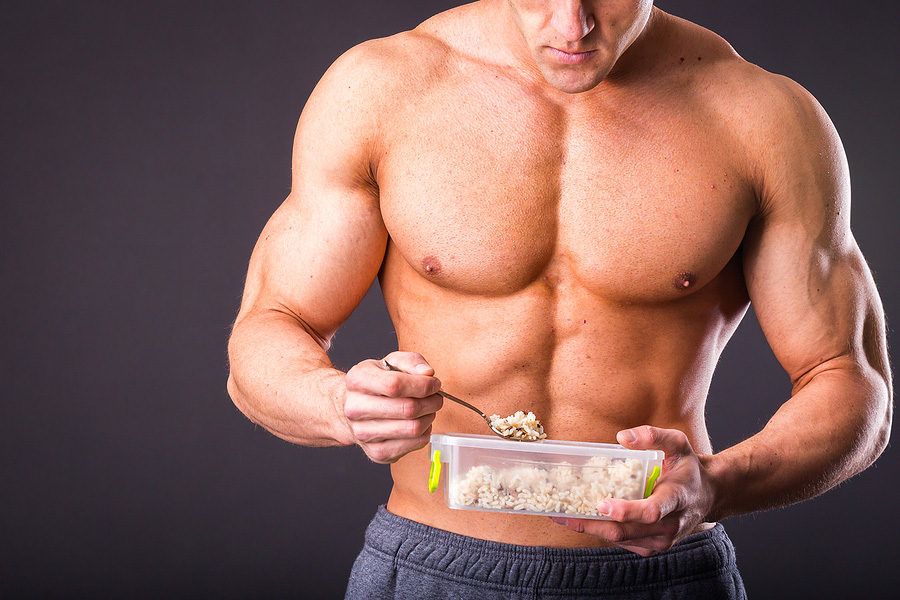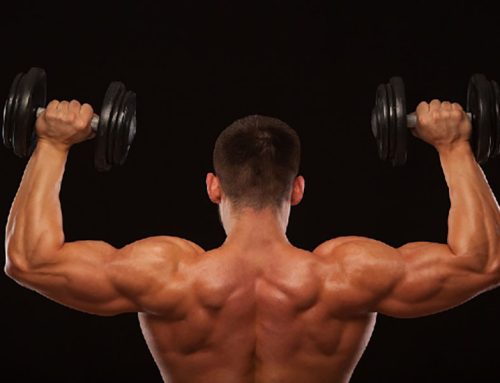What to eat before early morning workouts is one of the most common questions I’ve ever received and I continue to be asked about morning pre-workout nutrition to this day. Here’s one example of a concerned message I recently got on our Burn the Fat, Feed the Muscle Facebook Group:
Hey Tom. I get up at 5:30 am to lift, and on non-lifting days I do cardio for 30 to 45 minutes. I’ve been told I should eat before I workout, but I just can’t lift or do cardio with food bouncing around in my stomach. I don’t even feel that hungry in the early morning. I also don’t feel like I lack energy training on empty. The thing is, I’m worried about whether I’m hurting my gains. Would it suffice to take an amino acid supplement like BCAA, or should I try to at least have a very small meal? I would like to save my meals for when I’m really hungry, since I only have 1900 kcal per day to eat and I do have a healthy appetite the rest of the day. I currently have 18% body fat. My goal is to get it down to 12% or less without losing muscle.

Here’s my answer for what to eat before you lift…
Many people train early in the morning, and for a lot of reasons. One of them may include that it might be the only time they can do it because of family and work obligations during the day and evening.
Training in the morning is can be a plus for anyone, because you’re getting it done first and out of the way. There’s no worrying about blowing off an evening session because you feel tired or something unexpected comes up.
Another plus: When you start the day with a healthy, positive action step, you’re more likely to keep taking positive action the rest of the day to stay consistent with how your positive day started. You’re more likely to keep eating healthy after training in the early am because you don’t want to undo the good work you just did. If you start the day on the wrong foot, for example, with no training and a junk food breakfast, you’re more likely to go through your day thinking, “This day is already shot, so what the heck. I’ll eat whatever I want now and start over Monday.”
So you can see there are upsides to training in the early morning. It’s motivating and effective on many levels. If that’s your scheduling preference, then stick to it, regardless of what anyone tells you (or even what any study says):
What science says about the best time of day to lift weights
The Challenge With Pre-Workout Meals Early In the Morning: Your Time And Your Stomach
But there’s a potential problem that pops up for some people who lift in the early morning…
Out of necessity, you might need to train early, get it done fast, and then quickly move on with your busy day. Yet many people don’t have time to make a full breakfast. They don’t have time to sit around waiting for that big meal to digest before being able to train comfortably without nausea.
That might be a conundrum, especially for a serious bodybuilder who does not want to compromise an ounce of potential muscle gains. But right here in this post below, I have some reassurances, and some simple solutions…
When to eat the meal before your workout is usually dictated by stomach comfort. Most sports nutritionists recommend that you allow enough time between finishing your pre-workout meal and training as you need so the food has more or less emptied from your stomach, or at least it doesn’t feel like you have a full belly.
That amount of time is an individual matter, but typically it’s between 30 minutes and two hours. If you start getting more than three to four hours away from your training bout, we probably wouldn’t call that a “pre-workout” meal anymore.
Eating Before Lifting Versus Eating Before Cardio (Endurance Training)
Pre-workout eating strategies can vary based on whether we are talking about endurance training or resistance training. It also depends on the intensity, duration, and volume of the workout.
Let’s assume we’re not talking about pre-race nutrition for endurance. Let’s not even focus on pre-cardio nutrition. Let’s talk mainly about resistance training. This is the type of lifting you would do for strength and muscle-building or bodybuilding. (If you train for and compete in endurance events, consult a coach for guidelines on proper pre-, during- and post-exercise nutrition.)
Just one quick note about cardio in the morning for fitness and fat loss: Most people usually don’t have energy problems when doing low or even moderate intensity cardio for less than an hour, even totally fasted. Some people still believe that fasted cardio helps them with fat loss, especially the last bits of stubborn fat. But the weight of scientific evidence says fasted cardio is no more effective than fed cardio.
Fat loss depends on calorie deficit at the end of the day, consistently maintained over time, not whether you’ve eaten before training or not.
Fasted Cardio Revisited: Does Exercising On An Empty Stomach Really Burn More Fat?
Pre-Workout Food Intake And Training Performance – A Major Consideration
One reason people eat before all types of training is to fuel up for optimal performance and energy. Good lifting performance translates into better adaptations, including more muscle and more strength. On the other hand, anything you do nutritionally or otherwise that reduces your lifting performance is something to avoid if practical and possible.
A recent study on how lifting on empty might hurt your training was published in the Journal of Strength and Conditioning Research. It was called, “Breakfast omission reduces subsequent resistance exercise performance.” That title sums up what happened: Lifting performance decreased in the group that didn’t eat breakfast. Specifically, the repetitions were 15% lower in the back squat and 6% lower in the bench press.
The results of this single study are not necessarily a nail in the coffin for fasted lifting, because there were some nuances in this research. For example, the participants were doing multiple sets with the reps in the hypertrophy range. They were also pushing to failure. This tells us that pre-workout high-carb intake may be more beneficial when you train with high volume and intensity. If your workouts are shorter, lighter, and less intense, then training fasted (or consuming only protein) is less of an issue.
One more detail is that the subjects in this study were habitual breakfast eaters. If you’re used to eating breakfast before an early morning workout, and then you start skipping breakfast, it’s not surprising that your performance would take a dive. But it’s possible that people who are habituated to skipping breakfast may not have the same problem.
In addition, a follow up study on lifting fasted was conducted later by the same research group. One of the conclusions was that a decrease in performance may have something to do with lifting while feeling hungry. It may be physical. But this effect may also be psychological. Interesting, right?
Heres’s what this all means.
If you can train only lightly fed or even on empty and your workout performance and energy are not suffering at all, and you’re not even hungry, then that’s one concern you can cross off and not worry about. If you lifted fasted, just be absolutely sure that you get a high-protein post-workout mean quickly.
Some people can successfully lift fasted, some people can’t. Do not under-estimate how different individual responses can be and that’s why it’s so important to experiment and see what works best for you.
Still, it wouldn’t be smart to dismiss the possibility that weight training in a fasted state could decrease performance in the gym for many people. It’s very possible that you might not be fueled up properly if you lift fasted (especially if your muscle glycogen gets depleted from high volume training).
Nutrient Timing And Muscular Adaptations (Response To Training)
Fueling up before a workout so you perform your best during the workout is one reason to consider pre-workout nutrition. Another reason bodybuilders eat before weight training is to optimize the muscular adaptations and response to training. (Protein synthesis, prevention of protein breakdown, reduced cortisol, etc).
Most meals, including the pre-workout meal, should include healthy carbs and protein, but studies have shown that at least having a serving of quality protein (containing essential amino acids) prior to the workout is ideal to get the maximum results from your weight training, especially intense weight training.
The National Strength and Conditioning Association (NSCA) wrote a concise position paper called The Role of Nutrient Timing in the Adaptive Response to Resistance training and they summarized it into this take home message:
“Consuming a combination of carbohydrate and protein during the pre-exercise and post-exercise window will expedite recovery, improve performance, enhance various health parameters, and promote gains in lean body mass.”
“It is apparent from a growing body of literature that consuming protein (amino acids) or a combination of protein plus carbohydrate is important for enhancing the adaptive response to exercise. Believe it or not, as little as 100 calories may be of benefit. Based on the existing literature, it is apparent that you can consume protein / amino acids pre- and post-exercise (even without carbohydrate) and get significant benefits in terms of muscle fiber size and performance.”
“The data, albeit limited, also suggest that essential amino acids plus carbohydrate is the best way to promote skeletal muscle protein accretion, particularly if consumed pre- and post-workout. Nevertheless, the data are quite robust regarding the benefits of consuming protein/amino acids, protein plus carbohydrate or essential amino acids plus carbohydrate post-exercise.”
“From a practical standpoint, it would make sense that athletes should be advised to consume some type of meal before and after training. For the sake of convenience, this meal may be consumed as a ready-to-drink beverage.”
“Strength-power athletes would likely need to place greater emphasis on protein (and less so on carbohydrate) because of the dietary needs related to skeletal muscle growth whereas endurance athletes may need proportionately more carbohydrate with protein to promote skeletal muscle glycogen repletion.”
Options For Optimizing Nutrition While Dealing With Stomach Discomfort During Early Morning Workouts
If your stomach can’t handle a full meal before weight training or any intense workout in the early morning, what you can do is to have a light meal, a snack, or a drink (protein or protein plus carbs), as your pre-workout “feeding” (not really a whole “meal”). Then have your first primary meal (feeding number two for the day) relatively soon after training. Although this might not get you through a marathon training session, the research shows that it doesn’t take a lot of nutrients before a workout to elicit some favorable responses.
Alan Aragon and Brad Schoenfeld wrote a paper for the International Society of Sports Nutrition Journal and came up with a formula for pre- and post-workout window. Seems pretty much spot-on to me, so I included it in the nutrient timing recommendations in our Burn the Fat, Feed the Muscle program. They wrote:
“High-quality protein dosed at 0.4 – 0.5 g/kg of LBM at both pre- and post-exercise is a simple, relatively fail-safe general guideline that reflects the currently evidence showing a maximal anabolic effect of 20-40 grams…. Due to the transient anabolic impact of a protein-rich meal and its potential synergy with the trained state, pre- and post-workout meals should not be separated by more than 3 – 4 hours, given a typical resistance-training bout lasting 45-90 minutes.”
Research shows that it takes as little as 20-25 grams of protein to turn on protein synthesis. It seems to top out somewhere around 40 grams, so the response to protein seems to be more like an on-off switch than a dial. Eating more won’t hurt, but apparently won’t improve muscle growth or recovery.
Scientists are still debating which is more important, the pre- or post-workout nutrition, but as far as protein goes, it seems that before and after are both beneficial. Fortunately, it’s not that hard to get at least 20-25 grams of protein before your workout without overburdening your gastrointestinal system. You could get that much in one scoop of whey.
Go with whatever food or liquid that doesn’t cause you stomach discomfort. Some people have whey protein (whey makes a very light (thin) protein shake, especially when mixed only with water). If you choose, add piece of fruit like a banana – also easy on the stomach. I know other people who have a Greek yogurt (20 grams or more of protein in a cup).
Also, don’t be afraid to break out your blender – you can mix and liquefy breakfast staples like oatmeal and some people say drinking those same breakfast calories works for them, while a large bowl of cooked oatmeal in their stomach does not.
Skip The BCAA Supplements – Science Says They Are A Waste Of Money
Some people today are still taking branched chain amino acid (BCAAs) supplements (sometimes capsules, but usually a powdered stirred into water). However research has continued to show that BCAAs are a waste of money. What studies have found is that there’s no benefit to BCAA supplements in people who are already reaching their total protein goal for the day. Quality protein foods already contain BCAAs.
Some people argue that they’re in the group that can’t eat anything before lifting or they feel sick, so they figure an amino acid drink before and or during the lifting session is the answer (bodybuilding supplement companies want you to think so). But if that’s your situation, whey would be the better choice because whey is not only high in BCAAs, it also contains all the other essential amino acids as well, making whey arguably superior to amino supplements in isolation.
Branched-Chain Amino Acids Are A Waste Of Money (According To Science)
Don’t Forget To Consider Your Evening Meal
One more thought that doesn’t even cross most people’s minds: If you train fasted in the early morning, your last meal of the day the previous evening was technically your pre-workout meal, even though it was many hours distant from your morning training bout. While the protein you eat before bed is not going to still be in your system for your morning workout, the carbs you eat can provide energy for the next day’s workout, because carbs can be stored as muscle glycogen.
In the past, many people with fat loss goals would avoid eating a lot at night, especially carbs. But if you’re going to be training hard very early in the morning, you might experiment with having more of your same daily calories dinner including carbs (with protein). You might also try having your last meal later at night. Keep in mind that if your dinner was at 6 pm and you train the next morning at 6 am, that is not just training fasted, it’s training twelve hours fasted – something to consider for sure.
If you try eating later at night, pay attention not only to your body composition (body fat levels) but to your performance in the morning workout. You may see your performance increase. Years ago, I remember Tom Platz – a Mr. Universe winner and the man known for having the most muscular legs in the world – telling us at a seminar to eat a big pasta meal the night before a big leg workout the next morning.
If you move more calories to late in the day, then you do have to ‘save’ them by eating fewer earlier in the day. You’re eating the same calories, carbs, protein and fat either way – it’s just a matter of where you put them in the day. If you fail to remember this, eating more at night on top of what you were already eating could simply make you fatter. You’re shifting the time of your calorie intake, not just increasing it.
What To Eat Before Early Morning Resistance Training Workouts: Summing It All Up
When it comes to pre- and post-workout nutrition, nutrient timing does matter. However, the first and highest nutrition priority is that you consistently have your calorie and macronutrient goals met by the end of every day and that the majority of those calories come from healthy nutrient-dense whole food.
If you’re hitting your daily calorie and macro targets, and having great workouts, then you could consider any nutrient timing considerations as part of the minor details, not the top priorities. Still, it’s always important to consume high quality protein after lifting, and based on science, it’s ideal to have protein both before and after resistance training. You can lift fasted if you want to, and it won’t make or break your results, but it’s arguably not optimal.
Train hard and expect success!
Tom Venuto,
Founder & CEO, Burn the Fat Inner Circle
Author of Burn the Fat, Feed the Muscle
Author of The BFFM Guide to Flexible Meal Planning For Fat Loss
Join our free Facebook group
PS. If you do your resistance training workouts early in the morning and you don’t have a lot of time to train because you have a busy day, then be sure to check out The New Body (TNB) Turbo. This style of training builds more muscle in less time, cutting your workout time by as much as 50%, at home or in the gym. Click the link below to learn more:
T.N.B. TURBO: Ultra-Time Efficient Superset Training To Build Muscle Faster

Tom Venuto is a natural bodybuilding and fat loss expert. He is also a recipe creator specializing in fat-burning, muscle-building cooking. Tom is a former competitive bodybuilder and today works as a full-time fitness coach, writer, blogger, and author. In his spare time, he is an avid outdoor enthusiast and backpacker. His book, Burn The Fat, Feed The Muscle is an international bestseller, first as an ebook and now as a hardcover and audiobook. The Body Fat Solution, Tom’s book about emotional eating and long-term weight maintenance, was an Oprah Magazine and Men’s Fitness Magazine pick. Tom is also the founder of Burn The Fat Inner Circle – a fitness support community with over 52,000 members worldwide since 2006. Click here for membership details
Scientific References:
Antonio, J, Ziegenfuss T, The Role of Nutrient Timing in the Adaptive Response to Heavy Resistance Training, National Strength and Conditioning Association (NSCA)
Aragon A., Schoenfeld B., Nutrient Timing Revisited, Journal of the International Society of Sports Nutrition, 10:5, 2013.
Nashrudin, M, et al, Breakfast omission reduces subsequent resistance exercise performance, Journal of Strength And Conditioning Research, 33:7, 1766-1772, 2019.






Leave A Comment